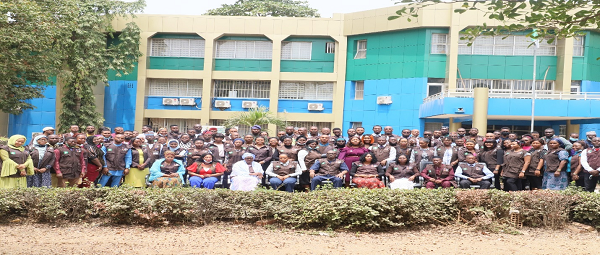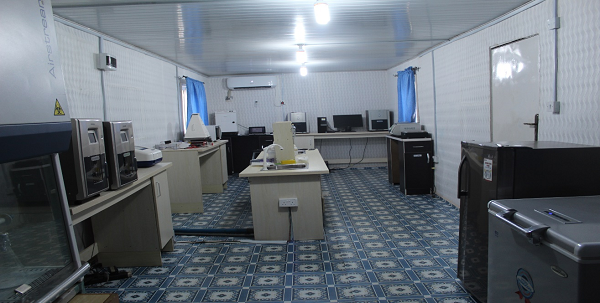
Nigeria’s Biosafety Regulatory body, the National Biosafety Management Agency (NBMA) has rolled out a roll-call of its achievements over the last seven years, 2015 to 2022, since its establishment.
The agency is supervised by the Federal Ministry of Environment, under the leadership of its director-general, Dr. Rufus Ebegba.
Addressing the media at the agency’s office in Abuja yesterday (December 29, 2022), the NBMA boss gave a run-down of the agency’s mandate, its achievements and prospects in 2023.
NBMA Mandate
The National Biosafety Management Agency (NBMA) is charged with the responsibility of providing regulatory/enforcement framework, institutional and administrative mechanism for safety measures in the application of modern bio-technology in Nigeria, with the view to preventing any adverse effect on human health, animals, plants and environment.
The agency’s decisions, Ebegba narrated, are based on scientific evidence in line with safety and socio-economic considerations.
“Prior to the inception of the NBMA, national issues related to biosafety were handled by a special biosafety unit in the Federal Ministry of Environment. Upon coming into force of the NBMA Act 2015, the unit transformed into the National Biosafety Management Agency (still under the Federal Ministry of Environment).”
Overall Milestones
Ebegba said since the establishment of NBMA (which coincided with the coming to be of the Muhammadu Buhari administration, the agency has recorded several milestones.

“Properly positioned and mainstreamed the agency into the national administrative structure; Developed robust capacity-building programmes which have led to a critical mass of well-trained and vibrant staff; Developed biosafety, operational and implementing instruments, regulations and guidelines to ensure effectiveness in the discharge of the agency’s mandate; Created robust synergy among stakeholders for effective regulation of GMOs and their products, as well as signing of MoU with relevant regulatory agencies; Ensured that only safe, modern biotechnology activities and GMO products are allowed in Nigeria.
“This is ensured through biosafety risk assessment and regular nationwide survey/surveillance, tracking and profiling of GMOs to ensure compliance with the biosafety permit conditions; Granting approvals for the commercialisation of Bt cotton, PBR cowpea and TELA maize after rigorous biosafety risk assessments; Biosafety approvals granted for biosafety facilities, containment, confirmed field trials, import of GM crops and developers; A critical mass of well-educated and sensitised stakeholders about NBMA’s role and increased commitment by stakeholders to ensuring safety in the sector.

Other achievements include the establishment of a national biosafety GMO detection and analysis laboratory with standard equipment; Making the NBMA a training hub for local and international university students interested in GMO detection and analysis; Ensuring Nigeria benefits from safe modern biotechnology under a legal framework for economic growth, improved agriculture, job and wealth creation, industrial growth and sustainable environment as operators now have confidence in the sector; Reduction of risks to human health from the practice of modern biotechnology practice and the use of GMOs are at their barest minimum.
Others are reducing the rate of dumping of unauthorised GMOs in Nigeria to the barest minimum, [as well as guarding against the] potential risk and socio-economic consequences of unauthorised GMOs; Development of the National Biosecurity Policy and Action Plan 2022-2026 using the one-health approach; Reaffirmation of Nigeria’s commitment to the principles of international agreements and treaties, to the Convention on Biological Diversity (CBD) and Cartagena Protocol on Biosafety (CPB).”
Ebegba listed some of the fallouts resulting from the achievements have international dimensions, vis other African countries now look up to Nigeria for leadership in biosafety, leading to Nigeria’s nomination as the first chair of the African Biosafety Regulators Forum.
In relation to scientists and researchers, Ebegba said an avenue is being provided to confirm and harness the potentials of modern biotechnology practitioners and reducing sectoral brain drain
For the economy, the director-general said biosafety approvals have led to increased confidence in the sector by investors, researchers, farmers and consumers with overall increased benefit to the economy.
“Approvals have added to stimulating and enhancing socio-economic development, industrial environment, health, green economy etc; Improved food security by provision of better seeds resistant to climate change, adverse climate conditions and pest and diseases; Increase in crop yields per planted area through reduced pest damage and increase gain in profit among farmers due to reduced use of agro-chemicals; Creation of direct and indirect job and wealth, as well as increased GDP; Increased presences as global trade player resulting in increased foreign earning [are some of the economic gains].”
Industrially, he said, safe, reliable, affordable and more qualitative raw materials for industries have resulted in the revamp of industries such as textile industries.
“Farmers have experienced reduction in pesticides and agro-chemical use and their attendant cost, increase in yields and early maturation of their crops, increased shelf-life of crops, improved protection from insects/pest and diseases, increased tolerance to heat, drought and other environmental stress, healthier and more protected farmers, increase in farmers’ income, reduction in communal clashes, improved social relationship between farmers and their spouses, increased farmers empowerment leading to increase in their socio-status, education of their family members and overall contribution to the economy and making unprotective soil available for protective agricultural uses.”
Ebegba said consumers are now more assured of safe, nutritious and more affordable food and environment leading to healthier society, increased disposable income and happier people, a reduction in the depilation of natural resources resulting in reduced communal clashes and increased nutritional food value by provision of biofortified foods.
“Environmentally, the agency has enabled and enhanced bioeconomy and green economy, contributed to biodiversity conservation, reduced greenhouse gasses’ emission from agricultural practices, thereby mitigating the effects of global warming and climate charge; Reduction in the impact of negative agricultural practices on the land, conservation of soil fertility, natural resources and energy; Minimisation in the use of toxic herbicides and fertilisers,” he explained.
Agenda 2023
Ebegba assured that, in 2023, the agency will consolidate on its achievements by creating more awareness and breaking new grounds through the implementation of the National Biosecurity Policy and Action Plan.


